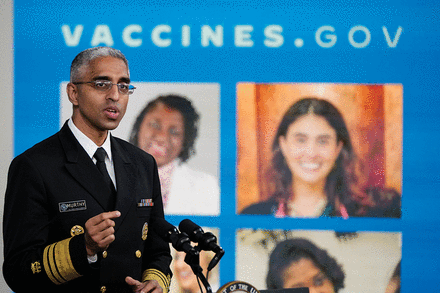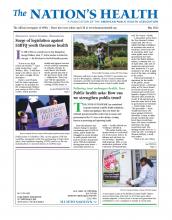
Volunteers walk door to door during COVID-19 vaccination outreach in Birmingham, Alabama, in June. Trusted community messengers can help reach people who have concerns about health recommendations. Maintaining trust is vital for public health.
Photo by Elijah Nouvelage, courtesy AFP/Getty Images
The COVID-19 pandemic has contributed to greater mistrust in public health institutions, leaders and guidance. But even before the outbreak spread around the world, trust in science and government in the U.S. were on the decline, creating barriers to protecting and improving health.
From fluoridation and climate change to measles vaccinations and COVID-19 safety, public health has struggled in recent decades to reach people who lack trust in science and government. With the pandemic driving trust even lower — and health and lives at stake — health officials are working to rebuild it.
“The public health community needs to credit itself for its successes, look to its failures and ask how can we do better,” Kathleen Hall Jamieson, PhD, a communication professor at the University of Pennsylvania, told The Nation’s Health.
A December survey from the Pew Research Center found only 29% of U.S. adults had high confidence in scientists who work in medicine, down from 40% in November 2020. And while public trust in the government has risen under the Biden administration, it remains low. As of April 2021, only 24% of Americans surveyed said they trusted the U.S. government to do what is right most of the time, according to the center.
Trust in government is important for the health of the public, recent research shows. A February study in The Lancet found low levels of trust in government and society were linked to higher COVID-19 infection rates around the world. If all nations had at least the same level of trust in government as Denmark — which ranks in the 75th percentile — there would have been 13% fewer global COVID-19 infections. If trust in other people reached the same level, there would have been 40% fewer worldwide infections, the study researchers said. The findings should serve as “a wake-up call,” according to Thomas Bollyky, a study lead author.

A nurse passes a sign at the Rockland County Health Department in Haverstraw, New York, in 2019 that warns about measles symptoms. A lack of trust in science and government has contributed to a U.S. resurgence in measles in recent years.
Photo by Johnannes Eisele, courtesy AFP/Getty Images
“Trust is an area where governments can move the needle,” Bollyky, director of the Global Health Program at the Council on Foreign Relations, said in a news release.
To be a trusted institution, competence and integrity are essential, according to a review of over 40 studies on trust in governments, health care and the media published in January in the Journal of Trust Research. People the public already trust — such as a barber, pastor, teacher or physician — can be effective messengers for public health.
Research consistently shows that physicians are among those who people trust most for advice. Gail Carson, PhD, an assistant professor in environmental studies at Colby College, said she wants doctors to talk about the harmful impact of climate change on human health with their patients, as it might encourage the public to adopt mitigation strategies.
“There is urgency to help people understand how climate change is a public health crisis, and the people on the front lines — emergency medicine doctors and pediatricians and others — really have a unique vantage point and position of influence to make a difference,” Carson, author of “Human Health and the Climate Crisis,” co-published this year by APHA Press, told The Nation’s Health.

People rally in support of science in Washington, D.C., in 2017. A December survey from the Pew Research Center found only 29% of U.S. adults had a great deal of confidence in scientists who work in medicine, down from 40% in November 2020.
Photo by Zach Roberts, courtesy NurPhoto/Getty Images
For public health messengers, communication must be clear and simple, devoid of jargon, mixed messaging and ambiguous statements, said Jamieson, director of the Annenberg Public Policy Center at the University of Pennsylvania.
“We need to ensure that every statement we make on behalf of the public health community is phrased as clearly and as accurately as possible and communicates not simply what we know at the time, but how we know it,” she said.
In situations where science is still evolving, as has happened during the pandemic on issues such as masking and transmission, officials should preface their statements with “based on what we know now,” she said.
“If you made just that one change, public health science would not have been as vulnerable to many of the deceptions that circulated about it,” she said.
Early in the pandemic, researchers in Australia and Canada examined whether a model developed to build trust during food-borne disease outbreaks could be used to manage the COVID-19 pandemic. In a July 2020 article in Frontiers in Public Health, they concluded that it could, recommending 10 strategies for strengthening public trust: transparency, credibility, building reputation, proactivity, putting the public first, collaborating with stakeholders, consistency, educating stakeholders and the public, developing protocols and procedures, and keeping promises.

Surgeon General Vivek Murthy, MD, MBA, provides an update in November on COVID-19 vaccination rates among people of color. People the public already trust, such as physicians, can be effective messengers for public health advice.
Photo by Drew Angerer, courtesy Getty Images
Reputation and credibility have suffered during the pandemic, though even beforehand they may not have been as high they should have been. Some of the public pushback on COVID-19 safety guidance was likely due to the public balking at being told what to do by health agencies they were unfamiliar with, said Brian Castrucci, DrPH, CEO of the de Beaumont Foundation.
“COVID protocols were challenged because we didn’t have a relationship of trust,” Castrucci told The Nation’s Health. “If we don’t learn from this instance, we will be doomed to repeat it.”
Public health should engage in a public relations campaign, he said, thinking of the public as consumers who need to know and understand what public health is, does and how the public benefits.
“Coming out of the pandemic, it is imperative that people know who their local health officials are, know who their state health officials are — that we are being aggressive, on the offense, of making sure people know what public health is. We have to build trust and resilience now for the next pandemic.”
In the early 20th century, public health focused its work on housing, sanitation and labor conditions. But as science and technology improved during the century, some disciplines moved away from hands-on social reform, disconnecting workers from the public. That removal “from people’s everyday lives” has contributed to the decline in public trust, according to David Rosner, PhD, a public health historian at Columbia University.
While trust can be built by demonstrating competence and integrity, that can be hard to do from a desk or lab. A shift away from community-driven work in some public health circles has left populations vulnerable to echo chambers of misinformation, Rosner said.
“If public health had really nurtured real fundamental social change so that people weren’t so frustrated, then I think there might have been some hope that we wouldn’t be in this situation,” Rosner told The Nation’s Health.
Castrucci recommended a back-to-basics, community approach to public health. Creating and supporting public health policies, advocating for systemic institutional changes and backing aspirational projects are important to improving population health, he said.
“We are fighting for the true spirit of public health, which is community change, and that means policy and systems changes,” Castrucci said. “There are a lot of us doing that, but we need more funding and more people doing it.”
For more information on trust in science and government, visit www.pewresearch.org.
- Copyright The Nation’s Health, American Public Health Association









